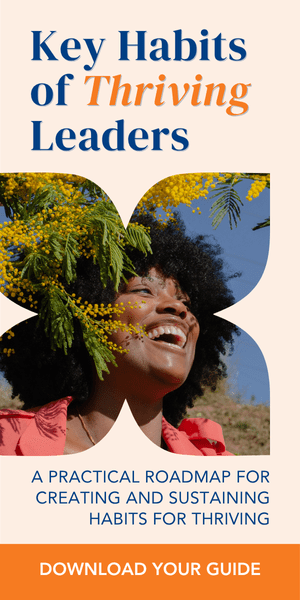Professional Women Need More Than Mantras
Dr. Chris Johnson, , recently hosted Wisdom Works CEO Renee Moorefield, along with Cindy Tsai, MD, and Belinda Ruiz, for a roundtable discussion on “The Wellness Fallacy.” They explored what wellness truly means for professional women and how to move towards it.
During the conversation, they discussed:
- The Wellness Fallacy and its impact,
- Why self-compassion is so vital to wellness,
- How to begin to uncover your values & fun ways to do it,
- The relationship between boundaries, decisions, and energy,
- Next steps for finding authentic wellness.
“We all have the capacity to thrive, and wellness is an active pursuit of activities, choices, and lifestyles that lead to holistic health and well-being.”
– Renee Moorefield, CEO of Wisdom Works
KEY TAKEAWAYS
Understanding the Wellness Fallacy and its impact
“Each one of us already has the innate capacity to thrive. Practiced in this context, behaviors support me in developing a healthier relationship with myself and in tapping into ways that I can already thrive. This is very different than, ‘I’m going to do this treatment because I don’t know myself and I lack something.’ Those are very different orientations. That’s part of the wellness fallacy that is not helping us as an industry.”—Renee Moorefield, CEO, Wisdom Works
Renee also stressed the importance of social and structural factors in organizational wellness, emphasizing that these factors are often more crucial than individual wellness behaviors such as eating, moving, resting, and breathing. According to research 80% of social determinants of health are tied to larger systemic changes, not individual actions.
She highlighted that people often need more autonomy at work, a greater sense of belonging, feeling valued, and feeling psychologically safe, in order to thrive at work. These factors are not only important for the individual, but also enhance the overall performance of an organization.
Why self-compassion is so vital to your wellness
The panel agreed that wellness is a conscious active pursuit, while wellbeing is a deeper orientation towards life. Wellbeing encompasses a healthy relationship with oneself, others, and the larger world.
Cindy Tsai described wellbeing as, “a comprehensive state that includes physical health, happiness, and overall life satisfaction.” Self-compassion is important as it promotes overall health and wellbeing.
“Knowing one’s own body and making informed decisions based on individual needs is key to wellness and well-being,” remarked Belinda Ruiz.
How to begin to uncover your values to access wellness
Cindy stressed the importance of self-awareness, self-love, self-acceptance, and self-compassion in achieving wellbeing. While Belinda highlighted the role of internal happiness and the need to resist societal conditioning that can impact self-compassion and wellbeing. Renee underscored the importance of letting go of external definitions and defining what a good life means in alignment with your personal values and aspirations.
The conversation concluded with the agreement that living a good life involves self-awareness, support, community, courage, and the ability to define what truly brings fulfillment and joy.
Next steps for finding authentic wellness – Thriving, what are the conditions?
Thriving is about making choices that extend the thriving nest in one’s life, rather than being about intelligence or external pressures.
All three leaders emphasized the importance of defining thriving for oneself. Renee pointed out that high achievement doesn’t always lead to personal wellbeing, while Cindy encouraged leaders to explore and choose their own lifestyle. Belinda suggested establishing non-negotiable habits for daily health and wellbeing.






